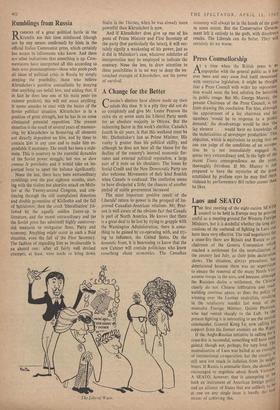Laos and SEATO
THE first meeting of the eight-nation SEATO council to be held in Europe may be proving useful as a meeting-ground for Western Foreign Ministers, but it is doubtful whether the long d15- cussions of the outbreak of fighting in Laos can have been very effective. The real negotiators for a cease-fire there are Britain and Russia as co' chairmen of the Geneva Convention which, reached a settlement for the neutralisation ot the country last July, as their joint declaration shows. The situation, always precarious, has deteriorated because there was no supervision to ensure the removal of the many North Viet' namese troops in the area, and because, although the Russians desire a settlement, the Chinese clearly do not. Chinese infiltration and road' building continue apace, as does the policy:4 winning over the Laotian neutralists, resulting in the retaliatory murder last week of th° neutralist Foreign Minister, Quinin Pholsena, who had veered sharply to the Left. in present fighting it is interesting to see the nentrat commander, General Kong Le, now calling far support from his former enemies on the Right. If the Anglo-Russian initiative in calling for a cease-fire is successful, something will have bort gained, though not, perhaps, for very long. 1 neutralisation of Laos was hailed as an exarnPI,e of international co-operation, but the country 15 still seen too much in isolation from its neigli" hours. If Russia is amenable there, she should be encouraged to negotiate about South Vietnarli; A SEATO, however, that is attempting to both an instrument of American foreign and an alliance of States that are unlikely to b! at one on any single issue is hardly the best means of achieving this.


































 Previous page
Previous page